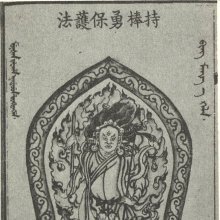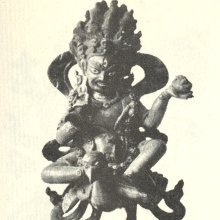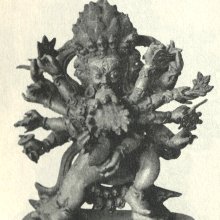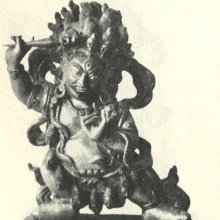Dandadhara, Daṇḍadhara, Daṇḍadhāra, Daṇḍadharā, Danda-dhara, Damdadhara: 15 definitions
Introduction:
Dandadhara means something in Hinduism, Sanskrit. If you want to know the exact meaning, history, etymology or English translation of this term then check out the descriptions on this page. Add your comment or reference to a book if you want to contribute to this summary article.
Images (photo gallery)
In Hinduism
Purana and Itihasa (epic history)
Source: archive.org: Puranic Encyclopedia1) Daṇḍadhara (दण्डधर).—A Kṣatriya King of Magadha. The following information about this King is available from the Mahābhārata.
Daṇḍadhara was born as the rebirth of a giant known as Krodhavardhana. (Mahābhārata Ādi Parva, Chapter 67, Stanza 46).
Bhīmasena, during his conquest of the countries, overcame King Daṇḍadhara and his brother Daṇḍa. (Mahābhārata Sabhā Parva, Chapter 30, Stanza 17).
In the battle between the Pāṇḍavas and the Kauravas, Daṇḍadhara fought from the back of an elephant against the Pāṇḍavas. When Daṇḍadhara began to exterminate the army of the Pāṇḍavas, Śrī Kṛṣṇa persuaded Arjuna to fight against Daṇḍadhara, who was killed in the fight. (Mahābhārata Karṇa Parva, Chapter 8, Stanzas 1 to 13).
2) Daṇḍadhara (दण्डधर).—One of the hundred sons of Dhṛtarāṣṭra. Bhīmasena killed this Daṇḍadhara in the battle of Kurukṣetra. (Mahābhārata Karṇa Parva, Chapter 84, Stanza 5).
3) Daṇḍadhara (दण्डधर).—A king who helped the Pāṇḍavas. Very often the name Maṇimān also occurs along with the name of Daṇḍadhara. They might have been brothers or sons of the same father by separate mothers. In the Mahābhārata, Ādi Parva, Chapter 186, Stanza 7, mention is made that these two had been present at the marriage of Draupadī. Droṇācārya killed both of them in the battle of Bhārata. (Mahābhārata Karṇa Parva, Chapter 6, Stanza 13).
4) Daṇḍadhara (दण्डधर).—A warrior born and bred in the country of Pāñcāla. He kept the rear of the army of Yudhiṣṭhira in the battle of Bhārata against the Kauravas. He died by an arrow of Karṇa. (Mahābhārata Karṇa Parva, Chapter 49, Stanza 27).
Source: archive.org: Shiva Purana - English TranslationDaṇḍadhara (दण्डधर) refers to “holding a staff”, according to the Śivapurāṇa 2.3.43 (“Description of Śiva’s wonderful sport”).—Accordingly, as Brahmā narrated to Nārada: “[...] Immediately the army of Śiva came there consisting of wonderful arrays of Bhūtas, Pretas and Gaṇas. [...] Some were awful with overgrown moustaches and beards. Some were lame. Some were blind. Some held staffs [e.g., daṇḍadhara] and nooses and some great iron clubs in their hands. Some rode on peculiar vehicles. Some played on horns. Some played on Ḍamarus. Some played on Gomukhas. Some had no faces. Some had distorted and deformed faces. Some had many faces. Some had no hands. Others had deformed hands. Some of them had many hands. [...]”.
Source: Cologne Digital Sanskrit Dictionaries: The Purana IndexDaṇḍadhara (दण्डधर).—Manu, the wielder of daṇḍa; also kings.*
- * Vāyu-purāṇa 57. 58; 85. 8.
Daṇḍadhāra (दण्डधार) is a name mentioned in the Mahābhārata (cf. I.108.11) and represents one of the many proper names used for people and places. Note: The Mahābhārata (mentioning Daṇḍadhāra) is a Sanskrit epic poem consisting of 100,000 ślokas (metrical verses) and is over 2000 years old.

The Purana (पुराण, purāṇas) refers to Sanskrit literature preserving ancient India’s vast cultural history, including historical legends, religious ceremonies, various arts and sciences. The eighteen mahapuranas total over 400,000 shlokas (metrical couplets) and date to at least several centuries BCE.
Shaivism (Shaiva philosophy)
Source: Shodhganga: Iconographical representations of ŚivaDaṇḍadhara (दण्डधर) or Daṇḍadharāgama refers to one of upāgamas (supplementary scriptures) of the Prodgītāgama which is one of the twenty-eight Siddhāntāgama: a classification of the Śaiva division of Śaivāgamas. The Śaivāgamas represent the wisdom that has come down from lord Śiva, received by Pārvatī and accepted by Viṣṇu. The purpose of revealing upāgamas (e.g., Daṇḍadhara Āgama) is to explain more elaborately than that of mūlāgamas (e.g., Prodgīta-āgama) and to include any new idea if not dealt in mūlāgamas.

Shaiva (शैव, śaiva) or Shaivism (śaivism) represents a tradition of Hinduism worshiping Shiva as the supreme being. Closely related to Shaktism, Shaiva literature includes a range of scriptures, including Tantras, while the root of this tradition may be traced back to the ancient Vedas.
Shaktism (Shakta philosophy)
Source: Google Books: ManthanabhairavatantramDaṇḍadharā (दण्डधरा) refers to “she who holds a staff” and is used to describe Caṇḍā—one of the nine attendants of Goddess Tvaritā, according to the Agnipurāṇa, the Tantrarāja verse 14.15-16 and the Kulakaulinīmata verse 3.82-88.—Accordingly, “1) Huṃravā (She who makes the sound Huṃ) has the form of a lightning flash and, auspicious, holds a thunderbolt weapon (vajrāyudha). 2) Khecarī (the Skyfaring Goddess) has the form of fire and is adorned with a javelin as a weapon. 3) Caṇḍā (the Fierce One) holds a staff [i.e., daṇḍadharā]. She is black (kṛṣṇa) and points (threateningly) at (both) gods and demons. [...]”.

Shakta (शाक्त, śākta) or Shaktism (śāktism) represents a tradition of Hinduism where the Goddess (Devi) is revered and worshipped. Shakta literature includes a range of scriptures, including various Agamas and Tantras, although its roots may be traced back to the Vedas.
Languages of India and abroad
Sanskrit dictionary
Source: DDSA: The practical Sanskrit-English dictionaryDaṇḍadhara (दण्डधर) or Daṇḍadhāra (दण्डधार).—a.
1) carrying a staff, staffbearer.
2) punishing, chastising; दत्ताभये त्वयि यमादपि दण्डधारे (dattābhaye tvayi yamādapi daṇḍadhāre) Uttararāmacarita 2.11.
3) exercising judicial authority. (-raḥ) 1 a king; श्रमनुदं मनुदण्डधरान्वयम् (śramanudaṃ manudaṇḍadharānvayam) R.9.3; बलीयानबलं ग्रसते दण्डधराभावे (balīyānabalaṃ grasate daṇḍadharābhāve) Kau. A.1.4.
2) Name of Yama; यमो निहन्ता (yamo nihantā)... ...दण्डधरश्च कालः (daṇḍadharaśca kālaḥ)
3) a judge, supreme magistrate.
4) a mendicant carrying a staff.
5) a potter.
6) a general (of an army;) Daśakumāracarita 2.
Daṇḍadhara is a Sanskrit compound consisting of the terms daṇḍa and dhara (धर).
Source: Cologne Digital Sanskrit Dictionaries: Shabda-Sagara Sanskrit-English DictionaryDaṇḍadhara (दण्डधर).—mfn.
(-raḥ-rā-raṃ) 1. Having a stick or staff. 2. Having authority to punish. m.
(-raḥ) 1. A name of Yama. 2. A king. 3. A potter. 4. A mendicant carrying a staff. E. daṇḍa punishment, a stick, &c. and dhara who holds or possesses; also daṇḍadhāra m. (-raḥ) daṇḍadhārin, &c. daṇḍaṃ laguḍaṃ vā dharati dhara-ac .
Source: Cologne Digital Sanskrit Dictionaries: Benfey Sanskrit-English DictionaryDaṇḍadhara (दण्डधर).—I. adj. 1. having a mast, [Rāmāyaṇa] 2, 97, 17. 2. holding a rod as symbol of justice, chastising, [Mānavadharmaśāstra] 9, 245; Mahābhārata 12, 694. Ii. m. 1. a king, [Raghuvaṃśa, (ed. Stenzler.)] 9, 3. 2. a judge, [Daśakumāracarita] 111, 12. 3. epithet of Yama, [Rājataraṅgiṇī] 4, 655.
Daṇḍadhara is a Sanskrit compound consisting of the terms daṇḍa and dhara (धर).
Source: Cologne Digital Sanskrit Dictionaries: Cappeller Sanskrit-English DictionaryDaṇḍadhara (दण्डधर).—[adjective] bearing the scepter or power; [masculine] king, general, judge.
--- OR ---
Daṇḍadhāra (दण्डधार).—[adjective] = [preceding] [adjective] (ka police officer).*
Source: Cologne Digital Sanskrit Dictionaries: Monier-Williams Sanskrit-English Dictionary1) Daṇḍadhara (दण्डधर):—[=daṇḍa-dhara] [from daṇḍa] mfn. ‘rod-bearer’, punisher (of. [genitive case]), ix, 245 [Mahābhārata xii; Rāmāyaṇa vi; Bhāgavata-purāṇa]
2) [v.s. ...] m. a king, ix, [Raghuvaṃśa ix, 3; Rājataraṅgiṇī iv]
3) [v.s. ...] Yama, 655
4) [v.s. ...] a judge, [vii, 1458]
5) [v.s. ...] = -mukha, [Daśakumāra-carita viii, 209]
6) [v.s. ...] a door-keeper, [Dharmaśarmābhyudaya ii, 76]
7) [v.s. ...] a mendicant, [Horace H. Wilson]
8) [v.s. ...] a potter, [Horace H. Wilson]
9) Daṇḍadhāra (दण्डधार):—[=daṇḍa-dhāra] [from daṇḍa] mfn. = raka, [Mahābhārata iii, 1596] (Yama), [Kāmandakīya-nītisāra; Rājataraṅgiṇī iv]
10) [v.s. ...] a king, [cf. Lexicographers, esp. such as amarasiṃha, halāyudha, hemacandra, etc.]
11) [v.s. ...] Yama, [cf. Lexicographers, esp. such as amarasiṃha, halāyudha, hemacandra, etc.]
12) [v.s. ...] Name of a prince slain by Arjuna (brother of Daṇḍa and identified with the Asura Krodha-vardhana), [Mahābhārata i f., viii]
13) [v.s. ...] of a son of Dhṛta-rāṣṭra, [i, 2738]
14) [v.s. ...] [plural] Name of a people, [Rāmāyaṇa (G) ii, 88, 7.]
Source: Cologne Digital Sanskrit Dictionaries: Yates Sanskrit-English DictionaryDaṇḍadhara (दण्डधर):—[daṇḍa-dhara] (raḥ) 1. m. A name of Yama; a king; a potter; a mendicant. a. Having a rod, staff or ceptre.
[Sanskrit to German]
Sanskrit, also spelled संस्कृतम् (saṃskṛtam), is an ancient language of India commonly seen as the grandmother of the Indo-European language family (even English!). Closely allied with Prakrit and Pali, Sanskrit is more exhaustive in both grammar and terms and has the most extensive collection of literature in the world, greatly surpassing its sister-languages Greek and Latin.
Kannada-English dictionary
Source: Alar: Kannada-English corpusDaṃḍadhara (ದಂಡಧರ):—
1) [noun] a man who walks with the help of a stick.
2) [noun] Yama, the Hindu god of Death and who awards punishment to human beings after their death.
3) [noun] a holder of a sceptre as a symbol of sovereignty.
4) [noun] a man holding a staff, as a guard, doorkeeper, etc.
5) [noun] an officer in the court of law who implements the punishment awarded by the judge.
--- OR ---
Daṃḍadhāra (ದಂಡಧಾರ):—[noun] = ದಂಡಧರ [damdadhara].
Kannada is a Dravidian language (as opposed to the Indo-European language family) mainly spoken in the southwestern region of India.
See also (Relevant definitions)
Partial matches: Dhara, Danda, Tanta.
Starts with: Dandadharadhipa, Dandadharadhipati, Dandadharaka, Dandadharana.
Ends with: Mahadandadhara, Sarvadandadhara, Vajradandadhara, Vetradamdadhara.
Full-text: Dandadharadhipa, Krodhavardhana, Sarvadandadhara, Dandadharaka, Dandadharadhipati, Mahadandadhara, Dandavratadhara, Dandasena, Dama, Prodgitagama, Danda, Vaivasvatamanu.
Relevant text
Search found 12 books and stories containing Dandadhara, Damdadhara, Daṃḍadhara, Daṃḍadhāra, Daṇḍa-dhāra, Daṇḍa-dhara, Danda-dhara, Daṇḍa-dharā, Daṇḍadhara, Daṇḍadhāra, Daṇḍadharā; (plurals include: Dandadharas, Damdadharas, Daṃḍadharas, Daṃḍadhāras, dhāras, dharas, dharās, Daṇḍadharas, Daṇḍadhāras, Daṇḍadharās). You can also click to the full overview containing English textual excerpts. Below are direct links for the most relevant articles:
Mahabharata (English) (by Kisari Mohan Ganguli)
Puranic encyclopaedia (by Vettam Mani)
List of Mahabharata people and places (by Laxman Burdak)
Bhajana-Rahasya (by Srila Bhaktivinoda Thakura Mahasaya)
Text 9 < [Chapter 3 - Tṛtīya-yāma-sādhana (Pūrvāhna-kālīya-bhajana–niṣṭhā-bhajana)]
Harshacharita (socio-cultural Study) (by Mrs. Nandita Sarmah)
Part 9.1: Infantry (padāti): < [Chapter 5 - Political Aspects]
The Brahmanda Purana (by G.V. Tagare)
Chapter 60 - The progeny of Vaivasvata Manu < [Section 3 - Upodghāta-pāda]
Related products



